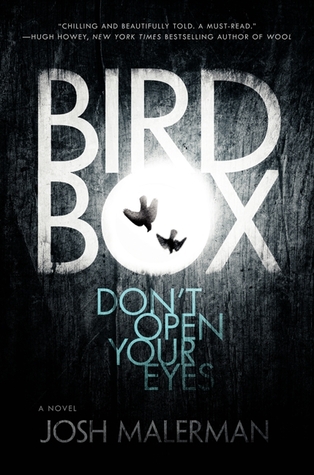How far can a person hear?
As I write this, it's literary prize season and I've been reading a lot of dense and tricky books, and in between, listening to an audiobook of Bird Box -- and thoroughly enjoying it. As much as I admire clever construction and layered meanings and intelligent wordplay, sometimes a person wants to just switch off the brain and surrender to a well-told story; and that's what Josh Malerman delivers here.
Bird Box is told in alternating time streams: in one, we meet Malorie as she discovers she is pregnant on the day that ushers in a post-apocalyptic event, eventually leading to her joining a safe house; and in the other, it's four years later and she is leaving the safe house via a dangerous river journey with her two small children. In both streams the danger is the same: something, some kind of creatures, have suddenly appeared that are so incomprehensible (like staring at infinity?) that if anyone should see one, that person will be compelled to commit suicide, taking out any innocent bystanders before doing so. Malorie is blindfolded outside the house, and inside, she and the children sit in the dim -- boards and blankets covering the windows -- training the children's hearing (but just how far can a person hear?). The river journey is harrowing (imagine making such a trip blindly) and, as Malorie thinks back over the intervening four years, small mysteries are dangled that must eventually be solved by the narrative from the other time stream -- and the tension is skillfully maintained: I kept asking myself, "Yeah, but what about…and why not…and who was it…?", and for the most part, my questions were eventually answered. And while it might be possible to nitpick some of the storyline choices, I completely bought into this world and accept it as written; I was looking for escapism and got it.
A book like this seems almost easy to have written: you think up a novel situation and then consider every logical reaction to it and populate a book with enough characters to act out each idea. That's pretty much what Bird Box is, but it's also well-written, tense, and surprises kept coming right to the end. Taken for what it is -- evaluated as a story and not some lofty literary effort -- it definitely deserves four stars.
My main question throughout Bird Box was: if the only danger the creatures pose is to people who see them, wouldn't you blind yourself? Wouldn't Malorie have blinded the babies from birth? Blind people negotiate our world just fine (and I imagine, those born blind adapt quickly enough) so there felt like a soft prejudice against the blind in his book -- like that was so taboo that people wouldn't even talk about it (and I can understand not wanting to voluntarily give up one of your senses in a post-apocalyptic world; survival was hard enough as it was, but...). The issue was, eventually, kind of brought up -- Malorie, alone in the safe house with her six month old babies, was on the brink of pouring paint thinner into the girl's eyes when she lost her nerve -- but I still thought that blinding them would have been the compassionate choice. I had the same reaction to The Day of the Triffids, and even as I was enjoying this book, I thought that Josh Malerman was reimagining some John Wyndham themes (and totally succeeding).

